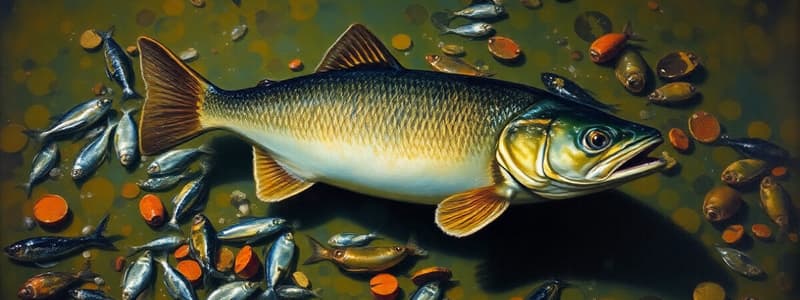Podcast
Questions and Answers
What do the authors of the paper by Vianna, Zeller, and Pauly emphasize as critical for global nutrition?
What do the authors of the paper by Vianna, Zeller, and Pauly emphasize as critical for global nutrition?
- Overfishing as a necessary practice
- Sustainable fisheries management (correct)
- Increasing fish consumption
- Reducing the global fish population
According to Zeller, Palomares, and Pauly, what significant aspects are highlighted by the Sea Around Us Project?
According to Zeller, Palomares, and Pauly, what significant aspects are highlighted by the Sea Around Us Project?
- The need for more fishing licenses
- Human-induced changes in marine environments (correct)
- Economic gains from fishing industries
- Fishing practices only affect fish populations
What percentage of their average per capita intake of animal protein do about 3.2 billion people obtain from fish?
What percentage of their average per capita intake of animal protein do about 3.2 billion people obtain from fish?
- 20% (correct)
- 30%
- 10%
- 50%
What is a primary goal of the data provided by the Sea Around Us Project?
What is a primary goal of the data provided by the Sea Around Us Project?
What is the primary objective of the Sea Around Us Project as reported in 2016?
What is the primary objective of the Sea Around Us Project as reported in 2016?
Which practice do the authors urge in order to maintain the benefits of fish for human nutrition?
Which practice do the authors urge in order to maintain the benefits of fish for human nutrition?
What key message is highlighted in the 2016 findings of the Sea Around Us Project?
What key message is highlighted in the 2016 findings of the Sea Around Us Project?
What role does accessible scientific information play for civil society, according to Zeller and colleagues?
What role does accessible scientific information play for civil society, according to Zeller and colleagues?
What significant threat to human health is mentioned in Vianna, Zeller, and Pauly’s discussion?
What significant threat to human health is mentioned in Vianna, Zeller, and Pauly’s discussion?
What is 'presentist bias' as discussed by Zeller and Pauly in 2018?
What is 'presentist bias' as discussed by Zeller and Pauly in 2018?
According to Zeller and Pauly (2018), why is incorporating long-term data important?
According to Zeller and Pauly (2018), why is incorporating long-term data important?
What do the findings of Zeller et al. contribute to regarding global initiatives?
What do the findings of Zeller et al. contribute to regarding global initiatives?
What problem does Zeller and Pauly (2018) identify as a consequence of ignoring historical data?
What problem does Zeller and Pauly (2018) identify as a consequence of ignoring historical data?
What was the focus of Zeller and Pauly's viewpoint in 2019 regarding fisheries?
What was the focus of Zeller and Pauly's viewpoint in 2019 regarding fisheries?
How does the Sea Around Us Project advocate for fisheries management?
How does the Sea Around Us Project advocate for fisheries management?
What do Zeller and Pauly suggest as a solution to presentist bias in fisheries science?
What do Zeller and Pauly suggest as a solution to presentist bias in fisheries science?
What does the title 'Collapse and recovery of marine fishes' suggest about the focus of Hutchings' 2000 report?
What does the title 'Collapse and recovery of marine fishes' suggest about the focus of Hutchings' 2000 report?
What primary issue does Pauly address in his 2002 report on sustainability in fisheries?
What primary issue does Pauly address in his 2002 report on sustainability in fisheries?
What significant theme is presented in 'The Sea Around Us Project: Documenting and communicating global fisheries impacts on marine ecosystems'?
What significant theme is presented in 'The Sea Around Us Project: Documenting and communicating global fisheries impacts on marine ecosystems'?
What is the main finding of Pauly's 2016 report regarding marine fisheries catches?
What is the main finding of Pauly's 2016 report regarding marine fisheries catches?
In Vianna’s 2020 report, which of the following aspects of fisheries is primarily discussed?
In Vianna’s 2020 report, which of the following aspects of fisheries is primarily discussed?
What concept does Zeller address in his 2018 report on time-series data in fisheries science?
What concept does Zeller address in his 2018 report on time-series data in fisheries science?
What critical issue does the report 'MSY needs no epitaph---but it was abused' address?
What critical issue does the report 'MSY needs no epitaph---but it was abused' address?
What main concern does Zeller's 2023 report highlight about global fisheries science?
What main concern does Zeller's 2023 report highlight about global fisheries science?
What primary issue is addressed in Pauly's 2002 report on sustainability in fisheries?
What primary issue is addressed in Pauly's 2002 report on sustainability in fisheries?
In Hutchings' 2000 report, what does the term 'collapse' primarily refer to?
In Hutchings' 2000 report, what does the term 'collapse' primarily refer to?
What significant theme is examined in the 2015 report 'Counting on small-scale fisheries' by Pauly?
What significant theme is examined in the 2015 report 'Counting on small-scale fisheries' by Pauly?
Which main concern does Zeller's 2023 report highlight about global fisheries science?
Which main concern does Zeller's 2023 report highlight about global fisheries science?
What key finding is presented in Pauly’s 2016 report regarding marine fisheries catches?
What key finding is presented in Pauly’s 2016 report regarding marine fisheries catches?
In the 2018 report, what critical issue does Zeller address regarding time-series data in fisheries science?
In the 2018 report, what critical issue does Zeller address regarding time-series data in fisheries science?
What aspect of fisheries is primarily discussed in Vianna’s 2020 report?
What aspect of fisheries is primarily discussed in Vianna’s 2020 report?
What does the title 'MSY needs no epitaph---but it was abused' suggest about Pauly's 2020 report?
What does the title 'MSY needs no epitaph---but it was abused' suggest about Pauly's 2020 report?
What is a primary focus of the paper by Vianna, Zeller, and Pauly in relation to fisheries management?
What is a primary focus of the paper by Vianna, Zeller, and Pauly in relation to fisheries management?
How does the Sea Around Us Project primarily contribute to public policy regarding fisheries?
How does the Sea Around Us Project primarily contribute to public policy regarding fisheries?
In Zeller et al.'s 2023 study, what detrimental effect is highlighted as a consequence of human actions on marine ecosystems?
In Zeller et al.'s 2023 study, what detrimental effect is highlighted as a consequence of human actions on marine ecosystems?
What does Vianna et al. advocate for in order to maintain the benefits of fish for human nutrition?
What does Vianna et al. advocate for in order to maintain the benefits of fish for human nutrition?
What significant role does the Sea Around Us Project play in relation to marine resource management as per Zeller et al.'s findings?
What significant role does the Sea Around Us Project play in relation to marine resource management as per Zeller et al.'s findings?
What significant issue does the Sea Around Us Project primarily address in its findings?
What significant issue does the Sea Around Us Project primarily address in its findings?
What aspect of fish consumption does Vianna et al. highlight as crucial for global nutrition?
What aspect of fish consumption does Vianna et al. highlight as crucial for global nutrition?
According to Zeller et al. in 2016, what is one challenge faced in reconstructing global catch data?
According to Zeller et al. in 2016, what is one challenge faced in reconstructing global catch data?
In Zeller and Pauly's 2018 study, what is identified as a consequence of 'presentist bias' in fisheries data?
In Zeller and Pauly's 2018 study, what is identified as a consequence of 'presentist bias' in fisheries data?
What critical message does Zeller et al. convey through their research on the Sea Around Us Project?
What critical message does Zeller et al. convey through their research on the Sea Around Us Project?
What crucial recommendation do Zeller and Pauly make regarding data analysis for fisheries management?
What crucial recommendation do Zeller and Pauly make regarding data analysis for fisheries management?
Which of the following best reflects Zeller and Pauly's viewpoint in their 2019 report on global fisheries management?
Which of the following best reflects Zeller and Pauly's viewpoint in their 2019 report on global fisheries management?
What aspect of data management does the Sea Around Us Project emphasize as critical for policy decisions?
What aspect of data management does the Sea Around Us Project emphasize as critical for policy decisions?
How does Zeller and Pauly suggest addressing the issue of misinterpretation caused by presentist bias?
How does Zeller and Pauly suggest addressing the issue of misinterpretation caused by presentist bias?
Which of the following is a key finding of the Sea Around Us Project regarding fishing patterns?
Which of the following is a key finding of the Sea Around Us Project regarding fishing patterns?
What do Zeller and Pauly highlight as important for fisheries management decisions?
What do Zeller and Pauly highlight as important for fisheries management decisions?
Flashcards are hidden until you start studying
Study Notes
Sea Around Us Project (Pauly 2016)
- Reconstructed historical global fisheries catch data to address gaps in official reporting.
- Aims to provide a more accurate representation of global fishery catches and distribution.
- Reconstructions indicate significant underreporting of global fish catches.
- Data reveal trends and patterns not captured in official statistics.
- Project makes data publicly accessible.
- Advocates for greater transparency and informed decision-making in fisheries management.
Presentist Bias in Time-Series Data - Fisheries (Zeller 2018)
- Emphasis on recent data at the expense of historical information.
- Distorts understanding of fish population trends and management effectiveness.
- Presentist bias undermines fisheries science and policy.
- Calls for incorporating long-term data to inform sustainable fisheries management.
Fisheries and Policy Implications for Human Nutrition (Vianna 2020b)
- Fish is a vital source of protein and nutrients for millions of people worldwide.
- Overfishing and declining fish stocks threaten human health and dietary diversity.
- Sustainable fisheries management is essential for ensuring access to fish.
- Need for policies that balance fishery productivity with ecological sustainability.
- Fish provides about 3.2 billion people with at least 20% of their average per capita intake of animal protein.
Global Fisheries Science Documents Human Impacts (Zeller 2023)
- Sea Around Us Project provides data and insights about human impacts on marine ecosystems.
- Data highlights the severity of overfishing and habitat degradation.
- Accessible scientific information empowers civil society to advocate for sustainable fisheries practices.
- Project supports global initiatives for improving marine resource management.
Still Catching Attention - Sea Around Us (Zeller 2016)
- Reconstructed global catch data, spatial expression, and public accessibility.
- Offers valuable insights into fishing patterns and trends.
- Helps address issues related to overfishing and resource sustainability.
The 'presentist bias' in time-series data: implications for fisheries science and policy (Zeller, 2018)
- Fisheries research often focuses on recent data, neglecting historical information.
- This "presentist bias" can distort our understanding of fish population trends and management effectiveness.
- Ignoring historical data can lead to misinterpretations of fish stock health and trends.
- A more balanced approach to data analysis that includes both historical and contemporary information is needed to improve fisheries science and management practices.
Fisheries and policy implications for human nutrition (Vianna 2020b)
- Fish is a vital source of protein and nutrients for millions of people worldwide.
- Overfishing and declining fish stocks pose significant threats to human health and dietary diversity.
- Sustainable fisheries management is essential for ensuring access to fish as a source of protein and nutrients for millions of people worldwide.
- Fish provide about 3.2 billion people with at least 20% of their average per capita intake of animal protein.
- Effective fisheries policies and practices that prioritize sustainability and protect marine resources are needed to maintain the benefits that fish provide.
Global fisheries science documents human impacts on oceans: The Sea Around Us serves civil society in the twenty-first century (Zeller 2023)
- Human activities have significant impacts on marine ecosystems.
- The Sea Around Us Project provides data and insights that inform both scientific understanding and public policy regarding fisheries management.
- The project's data highlights the severity of human-induced changes in marine environments, such as overfishing and habitat degradation.
- The Sea Around Us empowers communities and policymakers to take action towards sustainable ocean stewardship.
Still catching attention: Sea Around Us reconstructed global catch data, their spatial expression and public accessibility (Zeller, 2016)
- The "Sea Around Us" Project reconstructed historical global fisheries catch data to address gaps in official reporting.
- The reconstructed data reveals significant underreporting of global fish catches, highlighting trends and patterns not captured in official statistics.
- The project's findings advocate for greater transparency and informed decision-making in fisheries management to promote sustainable practices and better protect marine ecosystems.
Studying That Suits You
Use AI to generate personalized quizzes and flashcards to suit your learning preferences.




